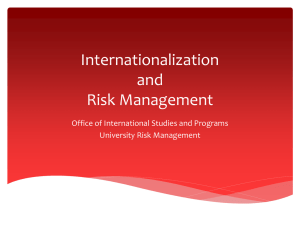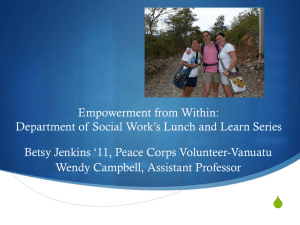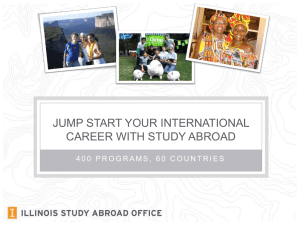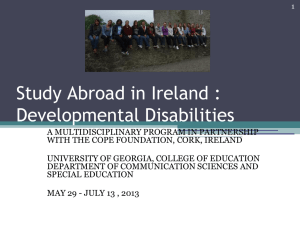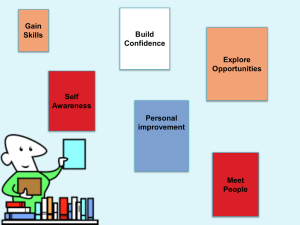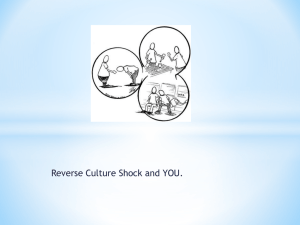Study Abroad- Part 2..
advertisement
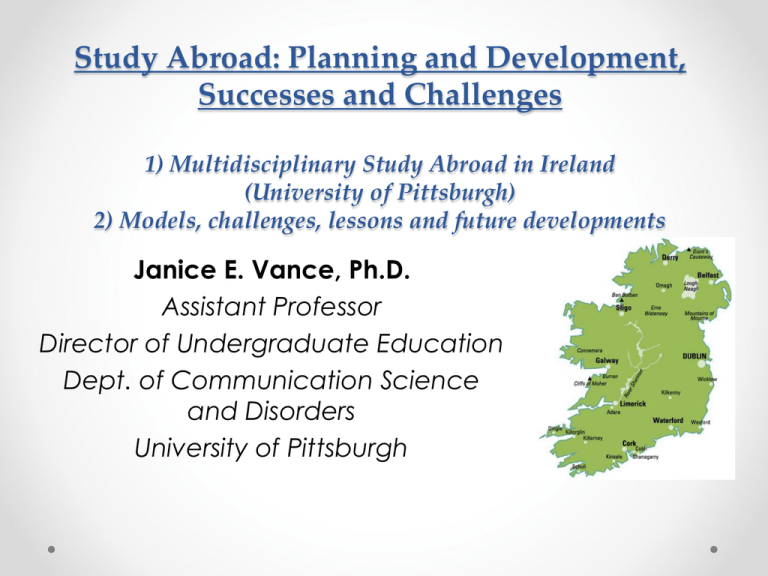
Study Abroad: Planning and Development, Successes and Challenges 1) Multidisciplinary Study Abroad in Ireland (University of Pittsburgh) 2) Models, challenges, lessons and future developments Janice E. Vance, Ph.D. Assistant Professor Director of Undergraduate Education Dept. of Communication Science and Disorders University of Pittsburgh Overview of today’s talk Brief introduction to SHRS Study Abroad in Ireland: o History, objectives, structure, academics and more Putting our faculty-led programs in perspective – • Models and options for study abroad The… what, where, who, how, when ……. The hard stuff • planning, funding, implementing The scary stuff • health and safety, insurance, liability And after all that – why? The benefits – to students, faculty, the university, study abroad sites…. Globalization and cultural competency – what are these and how do we promote them? What next…..? Tanzania and beyond…….. A brief history of the SHRS program • How – originally sponsored by European • • • • Studies Center, UCIS. Now self-sustaining… When – started in 2006 What – originally an Integrated Field Trip Abroad (IFTA) linked with a course: CSD 1011 Why – to provide a study abroad opportunity specifically for students in Communication Science (planning careers in Language Pathology and Audiology) Who – rising CSD seniors (12 students) Since then……. • Developed into a multi-disciplinary program: • 2007: o opened to Rehabilitation Sciences students (future careers in PT, OT, PA, pre-med) o (14 students) • 2008 – present: o Extended from 2 to 3 weeks o CSD, RS, Clinical Dietetics and Nutrition and Athletic Training o (18 – 25 students each year) 129 SHRS students have participated over the past 7 years Ireland – one island, two countries • BELFAST (UK) - Capital of Northern Ireland • • • • Population of NI: 1.5 million Stable population, but increasing number of immigrant from eastern Europe Health and Education structure same as UK • DUBLIN – Capital of Southern Ireland (Eire, Republic of Ireland) • Independent country from the UK • Population of Ireland: 5 ½ million and growing • Multicultural city due to large immigration from Eastern Europe and asylum seekers from Africa • Health and Education systems different from UK Program Objectives To provide students in the rehabilitation sciences with an opportunity to study abroad in a program related to their specific interests To expose the students to different models of health care and education across three countries (USA, UK and Ireland) To expose the students to clinical practice across a range of disciplines – developing interdisciplinary understanding and exposure to multidisciplinary teamwork – health and education To develop cultural competence….. Topics addressed • Health care structure, delivery systems, referral and reimbursement (history, current issues) • Educational structure, services for individuals with disability • Attitudes to disability • Scope of practice of each profession • Role of the interdisciplinary team in assessment and management • Public policy, economic, social and cultural issues affecting services and professional practice • Research for clinical practice and evidence-based care • Resources and services for specific conditions and disabilities o o o o o o o o o o Autism Physical disability in children Cognitive (learning) disability in children Speech and language disorders in children Hearing and visual impairments in children Swallowing deficits – children and adults Nutritional deficits and diabetes Stroke and head injury in adults Acquired hearing deficits Cochlear implants • Belfast sites o University of Ulster • Clinical Dietetics – research and practice o University of Ulster • Health and Rehabilitation Sciences Rehabilitation Institute o Fleming Fulton School for children with physical disability o Harberton School for children with moderate learning deficits o Oakwood Special Unit for early autism intervention o Thornfield School – Language Learning Project o Musgrave Park Hospital, Belfast • Regional Acquired Brain Injury Unit o Jordanstown School for Children with Auditory or Visual Impairments • Dublin sites o Deafhear • (National Association for Deaf People) – hearing help program for adults with acquired hearing loss o St. James’s Teaching Hospital – • SLP, PT, OT and CDN departments o Beacon Hospital – UPMC private hospital • all disciplines including nursing and social work. Course Work Prior to trip (Course CSD 1903 – 1 credit) discussions, papers and quizzes on history, health and education systems– US, UK and Ireland Multidisciplinary team presentations on conditions/disorders and services in US During and after trip (Course 1904 – 3 credits) Journal writing (ROLs) –academic, clinical and cultural insights Group discussions lead by multi-disciplinary teams Multidisciplinary team presentations on UK and Irish services for specific conditions/disorders Final academic paper on chosen topic – in multidisciplinary teams Future plans • Depending on resources at home and in Ireland • Extend to 4 weeks • Open to pre-med, nursing, education, psychology, social work ….. • Change structure to accommodate more and wider range of students o Core coursework for all – history, culture, structure and services in education, healthcare and social services o Specialized coursework o Core site visits for all o Specialized site visits Models of study abroad 1) Exchange programs 2) Off-the-shelf programs – run by 3rd party providers or other universities 3) University sponsored programs o Built and led by instructor 4) Service-learning programs/research projects 1) Exchange programs • Reciprocity arrangements between universities o Student takes classes offered from regular curriculum of host university o Credit for credit .. or …body for body o 15 credits – spread over 5 students (summer) o 1 student taking 15 credits (full semester) o Tend to develop through university/faculty contacts o Pros and cons • Study with local students • Useful for less popular countries • Separate contracts required for each exchange 2) Off-the-shelf programs • Designed and administered by 3rd party providers (for-profit businesses) o Several hundred providers (several thousand programs!) o Local university affiliation (university of record) o Develop curricula, hire instructors, provide infrastructure - classrooms, housing, staff, orientation, meals, health and safety, insurance, internship/clinical sites o Some have close relationship with specific US universities o US faculty may teach one or more courses in a program • Pros and cons o Opportunities for students (and faculty) at small colleges/study abroad offices o Direct enroll oppportunities o Expense o Quality o Pitt evaluations 3) Faculty developed and led • Pitt Panther programs (40-50 by end 2015) • Discipline-specific or multidisciplinary • Supported (and funded) by university o Legal support o Insurance and liability • Study Abroad Office support and ‘back-up’ o Logistics – flights, accommodation….. o Financial safety net o Emergency – health and other Not for the faint-hearted! • Setting up a program – you will need: o Good local contacts o First-hand knowledge of location – physical and cultural o Safe housing, transport, food, water o Classroom facilities for meeting/teaching o Knowledge of local health and emergency services o Language competence o Strong home university support system o Good communication systems • Setting up a program – continued o Flexible and hard-working colleagues o Time to plan and develop o Time and resources for recruiting o Leave or buy-out time to run program o Initial funding – buy-out, funds to travel for program development o Good budgeting skills And….. • Pros and cons o Discipline-specific o Focused o Flexible o Creative o Time-consuming and labor-intensive o Challenging on multiple levels o Risky 4) Service learning/research projects • Purpose o Site selection o Activities or projects….determined by whom? o Required skills and qualification o HIPAA and IRB o Materials and equipment o Supervision o Transport and safety o Liability issues o Health and other safety issues Why do students study abroad? • A student’s perspective and motivation: o Travel abroad - organized o Learn about another culture o Develop world view o Learn another language o Learn about myself – be more independent o Build resume o Program/career specific • ‘See how things are done in another country’ • Enhance possibilities of working abroad in professional field The educator’s perspective • The ‘what’, ‘why’ and ‘how’……. • Academic goals • Global competence • Cultural competence • How to evaluate o Programs o Students’ learning

